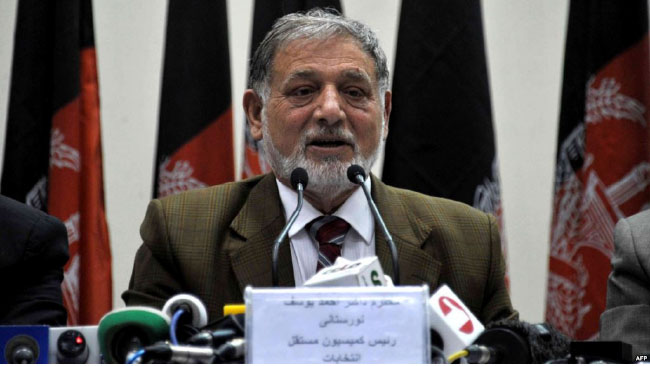The Afghan government and the parliament in recent weeks have been exploring ways to resolve the legal stalemate over the process of bringing reforms to the election laws and system. The MPs at the Wolesi Jirga have asked President Ashraf Ghani to propose an amendment bill to the parliament to make the required amendments to the election laws. In an attempt to resolve the legal stalemate over the election laws, the president has met a number of Wolesi Jirga lawmakers. The reports suggest, MPs emphasized that the previous decisions of the house over the presidential decrees on amendment of the electoral laws were valid and binding, requesting Ghani to present a proposed amendment to the electoral laws. While Ashraf Ghani has tasked the electoral selection committee to work on the list of their proposed names for membership of the Independent Election Commission and the Electoral Complaints Commission, some members of the parliament maintain that the work of the selection committee for recommending new members for the two election commissions is illegal.
The rejection of the two presidential decrees on amendment of the electoral laws as well as the law on structure, function and responsibilities of the two election bodies has led to growing uncertainties over the electoral reforms process which was set to result in a reformed electoral system in Afghanistan. The current legal stalemate over the electoral reforms is coming along with many other shortcomings and limitations to the country’s crucial reforms process. The stalemate is going to further put into uncertainty the prospect of the upcoming parliamentary and provincial councils’ elections. While the parliament has refused to amend the electoral laws based on the presidential decrees, the continuation of the task of the selection committee may face legal challenges and the legitimacy of the process could be potentially at risk.
The electoral reform process has come a long way ahead from within the initial political disagreements and polarization of politics of the country by the two major election camps. Both the parliament and the government need to redouble efforts to safeguard the process and find a way out of the current legal and procedural complicacies of the reform process. There is too much at stake if the process fails to deliver a reformed electoral process acceptable to all major stakeholders of the politics in the country. The political processes in the country would not be sustainable and transparent in absence of a reformed, fair and transparent electoral system. The controversial presidential election risked the legitimacy of the current political system and the formation of the government. The political crisis resulting from the 2014 presidential elections endangered long-term stability of the country while the insurgency is wreaking havoc in the country.
All sides of the government, the parliament and the Afghan political spectrum should focus on avoiding repetition of the past mistakes which endangered the country and bring in system and political procedures for safe political transitions in the country. The current reform process needs to go ahead considering both a comprehensive national consensus and legality and legitimacy of the whole process. Any reforms to the electoral systems and procedures should result to long-term enhanced stability and legitimacy of the state and serve long-term interests of the country. Afghanistan will no longer be able to afford flawed and fraudulent political processes and elections which would potentially lead to political instabilities. The government and the parliament need to do more to agree on a procedure for amending and approving the laws.
There is now growing disagreements among political groups and stakeholders. The polarization of the country’s politics would neither serve anyone’s interests nor the long-term stability of Afghanistan. Recently two more political groupings or coalitions came into exist, calling for reforms to the electoral laws and system, and even one recently-established political coalition led by former finance minister Anwarul haq Ahadi called for an early presidential election in the country. The formation of the two groups indicate the scale of political dissent and polarization of the politics in Afghanistan. The government needs to heed to calls from the political parties and the groups being formed by former officials and other politicians. There is a bitter conflict raging in the country. The insurgents are once again going to mount another round of their bloody violence across the country. This is while there is no clear prospect for the future of the conflict in the country. The government and the rest of the political spectrum in the country have been struggling in the past over a decade to help stabilization of the country. However, despite the past fourteen years of military efforts against the Taliban and other militants, stability and security still seems to be a distant dream for the people of Afghanistan. It is highly likely that the war continues in the upcoming years unabatedly and the government of Afghanistan remains engaged in a bloody conflict with the Taliban, while the peace process not yielding any positive results for peace in the country. A sound and politically inclusive reform process for the electoral laws and system would help stabilization of the country’s political establishment. Therefore, a reformed electoral system and the relevant laws and the responsible commissions would play a determining role in leading the country into the right direction. All stakeholders of the Afghan politics must commit themselves to safeguard the future political development. It is crucial for the reform process to conclude as quickly as possible to enable the authorities to make the preparations for holding the upcoming parliamentary elections. The preparations for the elections would be a time-consuming and lengthy process. After the formation of the two electoral commissions, the election commission should set a date for the elections for some time between summer and autumn next year. Success of the whole process lies with the success of the ongoing efforts for delivering a reformed electoral system in the county.

